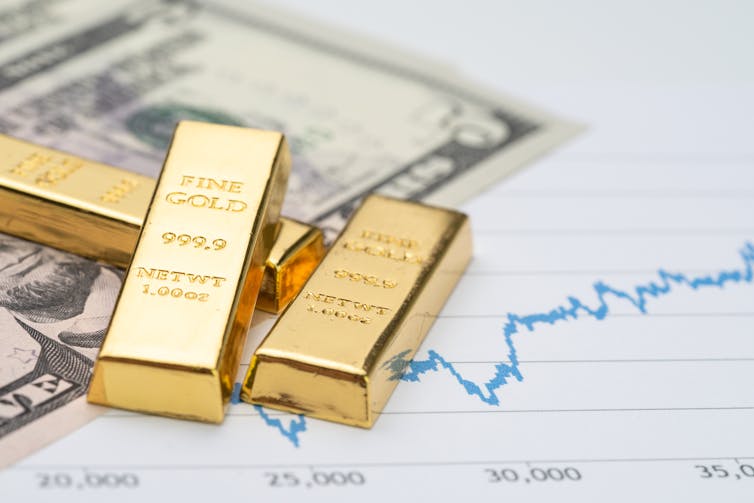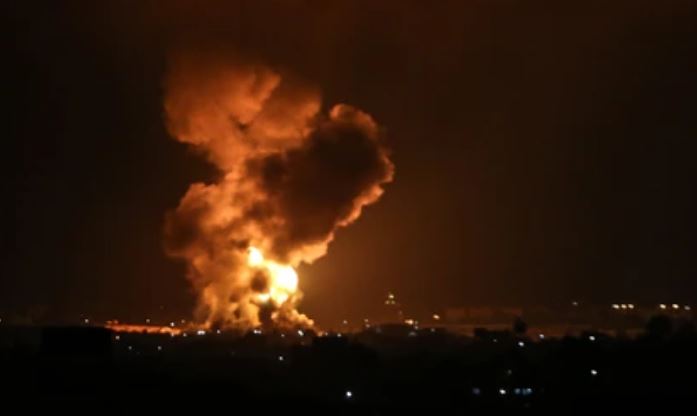Global geopolitical tensions often play a pivotal role in shaping people’s perceptions of economic growth. Research shows concern about such issues can cause people and businesses to become more cautious about spending and investing, which can ultimately lead to economic recession.
The recent escalation of the Israel-Palestine conflict is no different. Investors around the world are worried about the repercussions of this war – particularly in light of an already bleak picture for global economic growth.
Hamas’s October 7 attack on southern Israel is the latest chapter of a cycle of violence that has been going on in this region for decades and, sadly, seems to have no end in sight. While the reasons behind these events are complex, the conflict’s potential immediate and long-term economic ramifications are easier to grasp.
After all, if the Russia-Ukraine war has taught us one thing, it’s that we should be mindful of the intricate interdependencies that shape the global economic and geopolitical landscape.
How conflicts can affect the economy
Internal and inter-state conflicts often have a significant effect on stock market indices, exchange rates, and commodity prices – sometimes even sending prices higher in the lead-up to hostilities. The longer-term economic impact is typically more complicated to assess, however. The lasting effects of even seemingly dramatic events on investor behaviour can be hard to predict.
Conflicts in the Middle East tend to lead to spikes in oil prices – think of the OPEC oil embargo of 1973-1974, the Iranian revolution of 1978-1979, the Iran-Iraq War initiated in 1980, and the first Persian Gulf War in 1990-91. Since the region accounts for nearly a third of global oil supply, any instability can create market uncertainty based on concerns about interruptions to global oil supply.
This uncertainty is reflected in the risk premium in oil markets. This is the price paid for oil traded ahead of time in the futures markets versus the real-time price of oil. It reflects the profits that speculators expect to receive from buying and selling oil during a time of conflict, as well as the hedging needs of businesses that produce and consume oil and their concerns about supply and demand.
And so, the effect of the latest Israel-Hamas conflict on global financial markets will depend on the involvement of other major regional powers. If the conflict remains between Israel and Hamas, the effect will probably be limited and arguably exclusive to countries with direct trade exposure to Israel or Palestine.
But if the conflict spreads to major oil-producing nations in the region such as Iran, the global economy could face severe repercussions as energy costs for businesses and households could spike if supply is interrupted.
Higher energy prices would hamper central banks’ efforts to tame inflation pressures in most advanced and emerging economies. If this leads to a “higher for longer” monetary policy that keeps interest rates elevated, it would push up the cost of borrowing and refinancing by governments, companies and people.
History can offer some insights into how the impact on the global economy could unfold under these different scenarios. For instance, the 50-day war between Israel and Hamas in 2014, which killed 2,200 people, mostly civilians, had no significant effect on the global economy or financial markets.
Yet, when Israel and Hezbollah clashed in Lebanon in 2006, oil prices surged globally due to fears of a broader conflict in the Middle East.
What to expect this time
Unfortunately, there is another factor to consider at the moment. The escalation of the Israel-Palestine conflict has happened alongside the realignment of various global alliances. This slow creep of “deglobalisation” can be seen in a shift in trade policies in recent years.
Countries such as the US and UK are relocating economic activity including sourcing or manufacturing products from different countries out of concern about relying on suppliers in potentially hostile regions, as well as the impact of imports from low-wage countries on struggling local labour markets
At the moment, these shifts can also be seen in the reactions to the Hamas attack on Israel. A two-state solution) to the Israel/Palestine conflict was initially laid out by the United Nations in 1947 and reaffirmed in 1974, with almost unanimous support around the world.
But there has been some nuance in the international reactions to the attack. With most western countries quickly voicing support for Israel’s right to defend itself, while countries like China and Russia called for a ceasefire without taking a stance on Hamas.
This suggests that the issue of Israel-Palestine could tie in with the broader trend towards the new geopolitical divisions that were already starting to emerge before Hamas’s attack.
A prolonged conflict between Israel and Palestine, especially with the involvement of major regional powers, could further accelerate this global realignment and have detrimental consequences for global economic growth.

Investors often invest in gold as a eamesBot/Shutterstock
Under these circumstances, investors are already bracing for increased financial volatility across the board – from stocks and government bonds to commodity markets. So-called safe-haven assets like gold are typically used as protection against overwhelming economic uncertainty. The price of gold has shot up following the latest escalation in the Israel-Palestine conflict.
Financial markets will continue to monitor the conflict between Israel and Hamas for signs of escalation. Anything that pushes oil prices up further will reignite fears of higher inflation.
Unfortunately, this is happening just as many countries were starting to see inflation slow again after two years of persistently high consumer prices.
Daniele Bianchi does not work for, consult, own shares in or receive funding from any company or organisation that would benefit from this article, and has disclosed no relevant affiliations beyond their academic appointment.



 RBI Holds Repo Rate at 5.25% as India’s Growth Outlook Strengthens After U.S. Trade Deal
RBI Holds Repo Rate at 5.25% as India’s Growth Outlook Strengthens After U.S. Trade Deal  South Korea Assures U.S. on Trade Deal Commitments Amid Tariff Concerns
South Korea Assures U.S. on Trade Deal Commitments Amid Tariff Concerns  Singapore Budget 2026 Set for Fiscal Prudence as Growth Remains Resilient
Singapore Budget 2026 Set for Fiscal Prudence as Growth Remains Resilient  Gold Prices Slide Below $5,000 as Strong Dollar and Central Bank Outlook Weigh on Metals
Gold Prices Slide Below $5,000 as Strong Dollar and Central Bank Outlook Weigh on Metals  U.S. Stock Futures Slide as Tech Rout Deepens on Amazon Capex Shock
U.S. Stock Futures Slide as Tech Rout Deepens on Amazon Capex Shock  Asian Stocks Slip as Tech Rout Deepens, Japan Steadies Ahead of Election
Asian Stocks Slip as Tech Rout Deepens, Japan Steadies Ahead of Election  Trump Lifts 25% Tariff on Indian Goods in Strategic U.S.–India Trade and Energy Deal
Trump Lifts 25% Tariff on Indian Goods in Strategic U.S.–India Trade and Energy Deal  Trump Signs Executive Order Threatening 25% Tariffs on Countries Trading With Iran
Trump Signs Executive Order Threatening 25% Tariffs on Countries Trading With Iran  U.S.-India Trade Framework Signals Major Shift in Tariffs, Energy, and Supply Chains
U.S.-India Trade Framework Signals Major Shift in Tariffs, Energy, and Supply Chains  Japan Economy Poised for Q4 2025 Growth as Investment and Consumption Hold Firm
Japan Economy Poised for Q4 2025 Growth as Investment and Consumption Hold Firm  Russian Stocks End Mixed as MOEX Index Closes Flat Amid Commodity Strength
Russian Stocks End Mixed as MOEX Index Closes Flat Amid Commodity Strength  Bank of Japan Signals Readiness for Near-Term Rate Hike as Inflation Nears Target
Bank of Japan Signals Readiness for Near-Term Rate Hike as Inflation Nears Target  Gold and Silver Prices Rebound After Volatile Week Triggered by Fed Nomination
Gold and Silver Prices Rebound After Volatile Week Triggered by Fed Nomination  South Korea’s Weak Won Struggles as Retail Investors Pour Money Into U.S. Stocks
South Korea’s Weak Won Struggles as Retail Investors Pour Money Into U.S. Stocks  Oil Prices Slide on US-Iran Talks, Dollar Strength and Profit-Taking Pressure
Oil Prices Slide on US-Iran Talks, Dollar Strength and Profit-Taking Pressure  Global Markets Slide as AI, Crypto, and Precious Metals Face Heightened Volatility
Global Markets Slide as AI, Crypto, and Precious Metals Face Heightened Volatility  Dollar Near Two-Week High as Stock Rout, AI Concerns and Global Events Drive Market Volatility
Dollar Near Two-Week High as Stock Rout, AI Concerns and Global Events Drive Market Volatility 

































